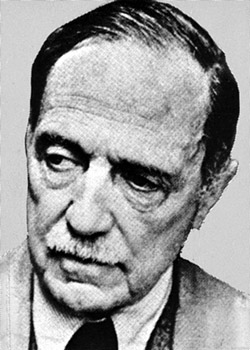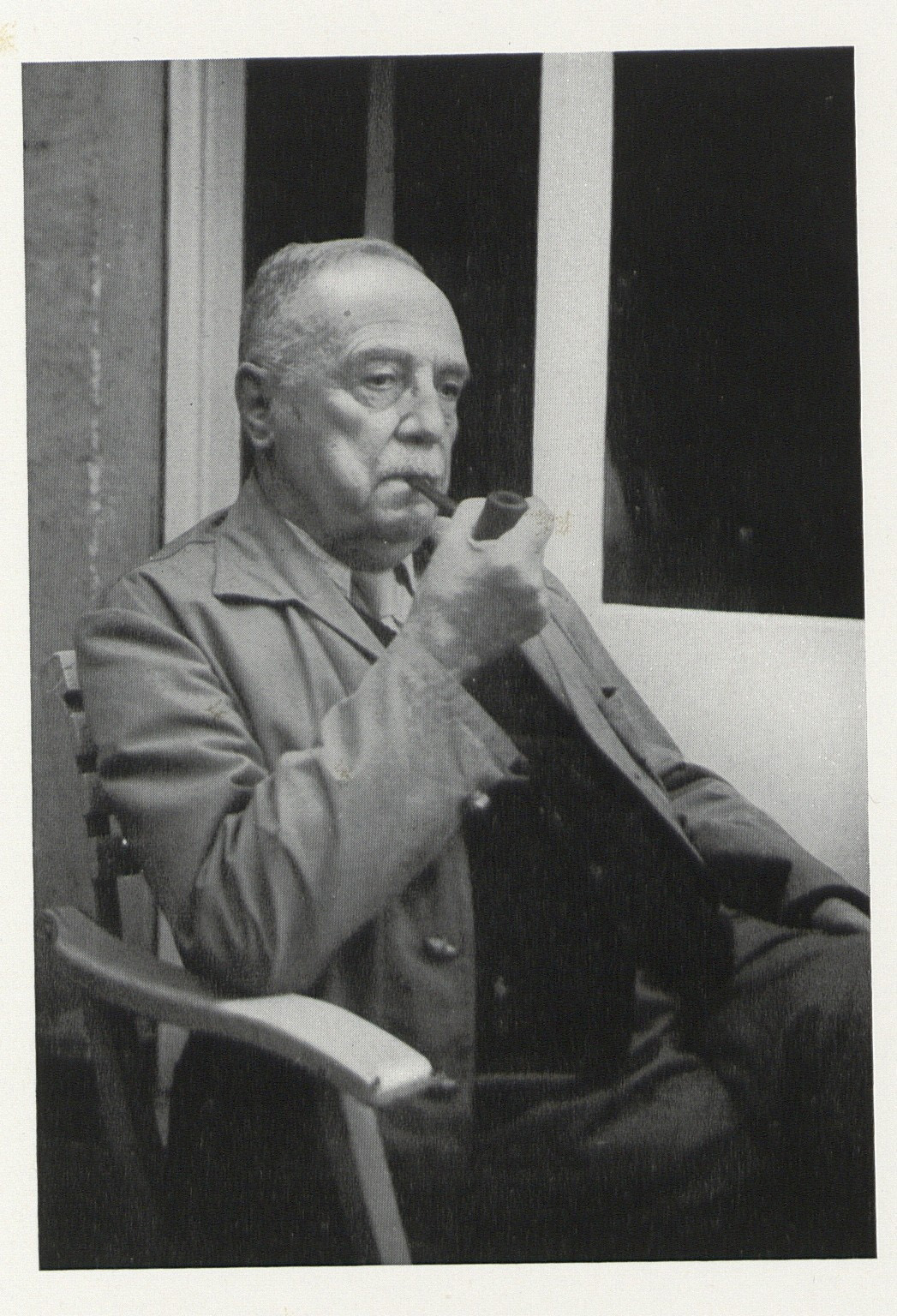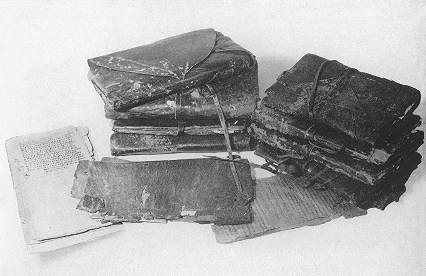 Rudolf Bultmann (1884-1976) was a German Lutheran theologian who taught at the University of Marburg. Bultmann is well know for his de-mythologizing method that he attempted to purge the New Testament of what he perceived to be legendary accretions to the Christian Tradition. The method is historically reminiscent of the penknife redaction of Marcion of Sinope (ca. 85-160) in the second century. Bultmann's de-mythologizing is part of the modern Higher Criticism and Form Criticism methodologies. Examples of Bultmann's de-mythologizing attempts are his all of his book, of which Jesus Christ and Mythology is arguably the most well known. Here is a helpful introduction from the appendix of Pope Benedict XVI's Jesus of Nazareth.
Rudolf Bultmann (1884-1976) was a German Lutheran theologian who taught at the University of Marburg. Bultmann is well know for his de-mythologizing method that he attempted to purge the New Testament of what he perceived to be legendary accretions to the Christian Tradition. The method is historically reminiscent of the penknife redaction of Marcion of Sinope (ca. 85-160) in the second century. Bultmann's de-mythologizing is part of the modern Higher Criticism and Form Criticism methodologies. Examples of Bultmann's de-mythologizing attempts are his all of his book, of which Jesus Christ and Mythology is arguably the most well known. Here is a helpful introduction from the appendix of Pope Benedict XVI's Jesus of Nazareth.
Bultmann, Rudolf: German Protestant biblical scholar and theologian (1884-1976) who attempted to "de-mythologize" Christianity--to separate what he considered the essence of Christianity from the world view of the scriptural authors, which he regarded as mythological. Bultmann was also among the leading proponents of "form criticism". He also maintained that the Gospels were not historical narratives but theology reshaped into the form of a story. He believed that Christianity needed to be understood in terms of the early philosophy of Martin Heidegger rather than what he regarded as the mythical world view of the biblical writers. (pg. 311, Jesus of Nazareth: Holy Week From The Entrance Into Jerusalem To The Resurrection by Joseph Ratzinger / Pope Benedict XVI)
Bultmann's demythologizing program invoked his search for the true history of Jesus Christ and Christianity, one with all legend and mythos removed and reconstructed in a more palatable form (-- but to who?) His short book Primitive Christianity: In Its Contemporary Setting contains all of his imaginary reconstructions and alleged sources to Christianity from Mystery Religions to Persians and Oriental borrowed concepts .
 Bultmann's famous solution was that Christianity was birthed out of Gnosticism and many other source religions and mythos across the Ancient Near East. Although this theory was very popular in its time, I don't believe it is advocated anymore after the discovery that proto-Gnosticism arose much later -- and out of Christianity (contra Bultmann).
Bultmann's famous solution was that Christianity was birthed out of Gnosticism and many other source religions and mythos across the Ancient Near East. Although this theory was very popular in its time, I don't believe it is advocated anymore after the discovery that proto-Gnosticism arose much later -- and out of Christianity (contra Bultmann).
Recently, Pope Benedict XVI criticized and rejected Bultmann's theory in his recent book. It's always fascinating to me when Catholic theologians (and especially pontifs(!)) respond to Liberal Protestantism, and the ways in which they do so, like the following quotation:
The reader asks: How does Bultmann know that? Bultmann's answer is breathtaking: "Even if the reconstruction of this kind of thinking has to be carried out in the main from sources which are later than John, nevertheless its greater age remains firmly established" (The Gospel of John, p. 27). On this decisive point Bultmann is wrong. In his inaugural lecture as professor at Tubingen, published in expanded form as The Son of God in 1975 (English translation 1976). Martin Hengel characterized "the hypothetical Gnostic myth of the sending of the Son of God into the world" as a "pseudo-scientific development of a myth." He then went on to remark: "In reality there is no Gnostic redeemer myth in the sources which can be demonstrated chronologically to be pre-Christian" (p. 33). "Gnosticism itself is first visible as a spiritual movement at the end of the first century A.D. at the earliest, and only develops fully in the second century" (p. 34). (pg. 220, Jesus of Nazareth: From the Baptism in the Jordan to the Transfiguration, by Joseph Ratzinger / Pope Benedict XVI)
Theology of the New Testament: Complete In One Volume (TWNT) is Bultmann's most famous two-volume work, and is what I'm working through now. I was initially introduced to Bultmann through the works of George Eldon Ladd many years ago. G.E. Ladd wrote his own A Theology of the New Testament (TNT), and I didn't realized it that Ladd's TNT is ironically a de-mythologizing Bultmann's TWNT (it's a pun folks). Ladd covers the same material as a conservative response, and has been a popular seminary book ever since. Ladd's responses include a dedicated book, Bultmann.
 Bultmann's TWNT Vol.1 is different from of his shorter methodological books, because in TWNT, he addresses all the New Testament scriptures that conflict with his program, as well as reading a reinterpretation of Scriptures that support his Gnostic Origins Theory. Bultmann occasionally refers to a Radical Gnosticism that is characterized by documents we possess from this heretical sect and best represented by the Nag Hammadi manuscripts discovered in 1945, which includes The Gospel of Truth, The Gospel of Judas and the Gospel of Thomas.
Bultmann's TWNT Vol.1 is different from of his shorter methodological books, because in TWNT, he addresses all the New Testament scriptures that conflict with his program, as well as reading a reinterpretation of Scriptures that support his Gnostic Origins Theory. Bultmann occasionally refers to a Radical Gnosticism that is characterized by documents we possess from this heretical sect and best represented by the Nag Hammadi manuscripts discovered in 1945, which includes The Gospel of Truth, The Gospel of Judas and the Gospel of Thomas.
Bultmann is valuable to understand what Christianity would be like if we didn't have the inspired Holy Scriptures and the Authority of the Church. Men who dismiss Christianity over textual difficulties really have not dismissed Christianity, they have used fundamentalism as a straw man, and destroying Fundamentalist arguments still doesn't answer the miracle of the Resurrection of the Son of God. Bultmann, will all his pinning and doubting and disbelief, still yet believed that the resurrection happened, even among all that he perceived as mythos.
Related: A Theology of the New Testament, Fundamentalism, g.e. ladd, George Eldon Ladd, Gnostic, Gnosticism, Gospel of Judas, Gospel of Thomas, Gospel of Truth, Jesus of Nazareth, Jesus of Nazareth: From the Baptism in the Jordan to the Transfiguration, Jesus of Nazareth: Holy Week From The Entrance Into Jerusalem To The Resurrection, Joseph Ratzinger, Martin Heidegger, Nag Hammandi Library, Pope Benedict XVI, Roman Catholicism, Rudolf Bultmann, The Gospel of John, Theology of the New Testament: Complete In One Volume, TNT, TWNT



July 29th, 2021 - 13:51
Fine work. I liked the phrase (pun) citing the need to de-mythologize Bultmann.